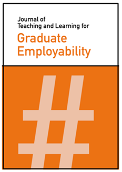Using image-reflections to support undergraduate students’ relational employability: A practitioner reflection
DOI:
https://doi.org/10.21153/jtlge2024vol15no2art2030Keywords:
Relational employability; health science educators; teaching and learning; visual media; reflective practice; undergraduate student reflections; career development and employability; curriculum designAbstract
This practitioner reflection explores our integration of the Relational Employability Framework within the Health Research Project capstone unit of a Bachelor of Health Science degree. To address the historically low quality of student reflections, we incorporated image-based reflective activities to improve engagement and depth. These activities encouraged students to use visual media to examine their developing relational employability. We developed and implemented a series of tutorial activities designed to scaffold this process, aiming to foster deeper reflective practice and highlight its importance for career development and employability. Our reflections indicate that, while grades did not significantly increase, students showed enhanced critical thinking and engagement with reflective practice, suggesting the framework’s effectiveness in broadening awareness and enriching employability overall. We discuss the need for peer support among educators to sustain and enhance reflective practices in teaching-learning and conclude with thoughts on our ongoing efforts to embed and expand reflective practices in teaching approaches
References
Bennett, D. (2015). Pre-service teachers’ intentions to teach: Developing understanding through textual narratives and drawings. In B.-M. Apelgren, P. Burnard, & N. Cabaroglu (Eds.), Transformative teacher research: Theory and Practice for the C21st (pp. 141–154). Sense Publishers. https://doi.org/10.1163/9789463002233_012
Bennett, D. (2016). Developing employability and professional identity through visual narratives. Australian Art Education, 37(2), 100–115.
Chaffey, L. J., de Leeuw, E. J. J., & Finnigan, G. A. (2012). Facilitating students′ reflective practice in a medical course: Literature review. Education for Health, 25(3), 198–203. https://doi.org/10.4103/1357-6283.109787
Cook, E. J. (2022). A narrative review of graduate employability models: Their paradigms, and relationships to teaching and curricula. Journal of Teaching and Learning for Graduate Employability, 13 (1), 37–64. https://doi.org/10.21153/jtlge2022vol13no1art1483
Cook, E. J. (2023a). Relational employability teaching and learning framework. Edith Cowan University. https://doi.org/10.25958/5kc1-6j30
Cook, E. J. (2023b). "For me it's like oxygen": Using design research to develop and test a relational employability framework. [Doctoral Thesis]. Lancaster University. https://doi.org/10.17635/lancaster/thesis/2214
Cook, E. J. (2023c). Relational employability stages of development. Edith Cowan University. https://doi.org/10.25958/q057-dy71
Cook, E. J., Doherty, S-A., & Wallace, R. (2024). Preparing the future public health workforce: Integrating relational employability to foster critical global citizenship. Preprints 2024, 2024081359. https://doi.org/10.20944/preprints202408.1359.v1
Darcie, I., vander Kloet, M., & Gray, R. (2024). Finding your feet in the dark: how making teaching and learning visible enables change in course and assessment design. European Journal of Higher Education. Advance online publication. https://doi.org/10.1080/21568235.2023.2301599
Driscoll, J. (2006). Practising clinical supervision: A reflective approach for healthcare professionals. Elsevier Health Sciences.
Eaton, C. (2016). “I don’t get it”, – the challenge of teaching reflective practice to health and care practitioners. Reflective Practice, 17(2), 159–166. https://doi.org/10.1080/14623943.2016.1145582
Hargreaves, K. (2016). Reflection in Medical Education. Journal of University Teaching & Learning Practice, 13(2). https://doi.org/10.53761/1.13.2.6
Harvey, M., Coulson, D., & McMaugh, A. (2016). Towards a theory of the ecology of reflection: Reflective practice for experiential learning in higher education. Journal of University Teaching & Learning Practice, 13(2), 1–20. https://doi.org/10.53761/1.13.2.2
Hawe, E., Lightfoot, U., & Dixon, H. (2019). First-year students working with exemplars: Promoting self-efficacy, self-monitoring and self-regulation. Journal of Further and Higher Education, 43(1), 30–44. https://doi.org/10.1080/0309877X.2017.1349894
Hiscox, T. J., Papakonstantinou, T., & Rayner, G. M. (2022). Written reflection influences science students’ perceptions of their own and their peers’ teamwork and related employability skills. International Journal of Innovation in Science and Mathematics Education, 30(4), 15–28. https://doi.org/10.30722/IJISME.30.04.002
King, A. E., Joseph, A. S., & Umland, E. M. (2017). Student perceptions of the impact and value of incorporation of reflective writing across a pharmacy curriculum. Currents in pharmacy teaching & learning, 9(5), 770–778. https://doi.org/10.1016/j.cptl.2017.05.010
Lacković, N. (2019). Graduate employability (GE) paradigm shift: Towards greater socioemotional and eco-technological relationalities of graduates’ futures. In M. Peters, P. Jandrić & A. Means (Eds.). Education and technological unemployment (pp. 193-212). Springer. https://doi.org/10.1007/978-981-13-6225-5_13
Lacković, N., & Olteanu, A. (2023). Graduate employment futures and relational employability: In conversation with Elizabeth J. Cook. In Relational and multimodal higher education: Digital, social and environmental perspectives (pp. 301-315). Routledge. https://doi.org/10.4324/9781003155201-16
Lim, R. B. T., Tan, C. G. L., Hoe, K. W. B., Teng, C. W. C., Müller, A. M., Azfar, J., Narayanasamy, S., & Liow, C. H. (2023). Teachers’ perceptions, facilitators, and barriers to the regular use of self-reflection in public health higher education during COVID-19 — a mixed methods approach. Reflective Practice, 24(4), 447–463. https://doi.org/10.1080/14623943.2023.2210066
Rolfe, G., Freshwater, D., & Jasper., M. (eds). (2001). Critical reflection for nursing and the helping Professions: A user’s guide. Palgrave.
Strampel, K. (2010). Using web 2.0 technologies to enhance learning in higher education. [Doctoral Thesis]. Edith Cowan University. https://ro.ecu.edu.au/theses/2094/
Tikkamäki, K., & Hilden, S. (2014). Making work and learning more visible by reflective practice. Research in Post-Compulsory Education, 19(3), 287–301. https://doi.org/10.1080/13596748.2014.920577
To, J., Panadero, E., & Carless, D. (2022). A systematic review of the educational uses and effects of exemplars. Assessment & Evaluation in Higher Education, 47(8), 1167–1182. https://doi.org/10.1080/02602938.2021.2011134
United Nations Educational, Scientific and Cultural Organization. (2021). Global citizenship education. https://web.archive.org/web/20230401034959/https://en.unesco.org/themes/gced/
Veine, S., Kalvig Anderson, M., Haugland Andersen, N., Espenes, T. C., Bredesen Søyland, T.,Wallin, P., & Reams, J. (2020). Reflection as a core student learning activity in higher education – Insights from nearly two decades of academic development. International Journal for Academic Development, 25(2), 147–161. https://doi.org/10.1080/1360144X.2019.1659797
World Health Organization (2024). The Ottawa Charter for Health Promotion. https://www.who.int/teams/health-promotion/enhanced-wellbeing/first-global-conference
Downloads
Published
Issue
Section
License
Copyright (c) 2024 Ruth Wallace, Sally-Anne Doherty, Elizabeth J. Cook

This work is licensed under a Creative Commons Attribution-NonCommercial 4.0 International License.












